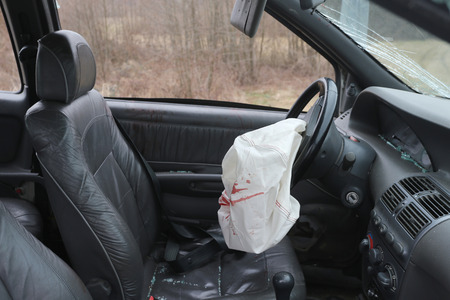


Common Car Accident Airbag Injuries
While airbags save many lives in car accidents they are also sometimes the cause of serious injuries. If you sustained temporary or permanent injuries by an air bag in a car accident you may be able to recover damages for your airbag injuries with the help of a car accident airbag injury lawyer.
Read More


Car Accident Airbag Deployment Can Cause Undetectable Cardiac Injuries
Airbags save lives but they are still a relatively new technology and despite a lot of safety improvements in the last decade, they have a long way to go. Dr. Rami Khouzam of the University of Tennessee Health Science Center in Memphis explains that serious cardiac and pulmonary injuries can happen as a result of airbag deployment even when no visible injury presents itself in the initial medical evaluation.
The most common types of cardiovascular injuries following airbag deployment in a car accident are aortic transection, tricuspid-valve injury, right atrial rupture, cardiac contusion, MI, aortic-valve avulsion, cardiac tamponade, and hemopericardium. Airbag deployment can also cause rib and sternum fractures. Some people may also experience new-onset or exacerbated asthma or have inhalational chemical pneumonitis from byproducts of a chemical reaction in which sodium azide powder releases nitrogen gas that inflates the airbag. If the airbag is ruptured, the release of alkaline chemicals can cause burns.
Are Airbags Safe for Everyone?
The truth is that airbags should be turned off when children or a short person are sitting in the seat. Sitting closer than 10 inches to the airbag can cause more injury to a person than it would provide safety. Injuries from airbags still happen, even with the latest technology. Surprisingly, low-speed collisions where a person is not wearing a seatbelt cause the most damage when an airbag is released.
How do Doctors Identify Cardiac and Pulmonary Complications?
It can be difficult to identify cardiac or pulmonary injuries in the wake of a car accident because there is often a lack of chest pain and other visible wounds can be distracting. Doctors may look for signs of cardiac strain or atrium ruptures after airbag deployment because the anterior chest wall receives the full impact of the airbag. MI and valvular injury may be masked by blunt cardiac trauma of collision, and a medical doctor may decide that an evaluation by coronary angiogram and transthoracic echocardiogram is warranted.
History of the Airbag
First generation frontal airbags did not differentiate between the weight of the passenger or the speed of the crash, they deployed with the same force in every situation. As a result, many short adults and children who were not wearing seatbelts or were sitting too close were seriously injured or died when the airbag deployed. In 1998, second generation airbags were introduced and were designed to deploy less forcefully. In 2003, some cars were built with third-generation or “advanced” frontal airbags that are sensitive to the passenger’s weight and the speed of the collision. All passenger cars and light trucks produced after September 1, 2006, are required to have advanced frontal air bags, and newer cars also have side airbags. Airbags can be turned off manually if necessary.
In 2011, 21, 253 people died in motor vehicle accidents; of these, 56 percent were not wearing seatbelts. It is estimated that 2,204 lives were saved by frontal airbags in 2011. It does need to be acknowledged, however, that since June, 2003 144 children and 87 adults have died because of airbags, and many others have sustained injuries. Car manufacturers clearly still have some work to do to reach the sweet spot where increased safety brought by the airbags outweighs the risks they pose.
If you or a loved one were injured in a car accident, you have enough to deal with. Let an experienced accident attorney fight for the full compensation that you deserve. It is not uncommon to receive a settlement from the insurance company that is two to three times bigger with the help of a lawyer. Contact the caring accident attorneys at Tario & Associates, P.S. today for a FREE consultation!
Read More